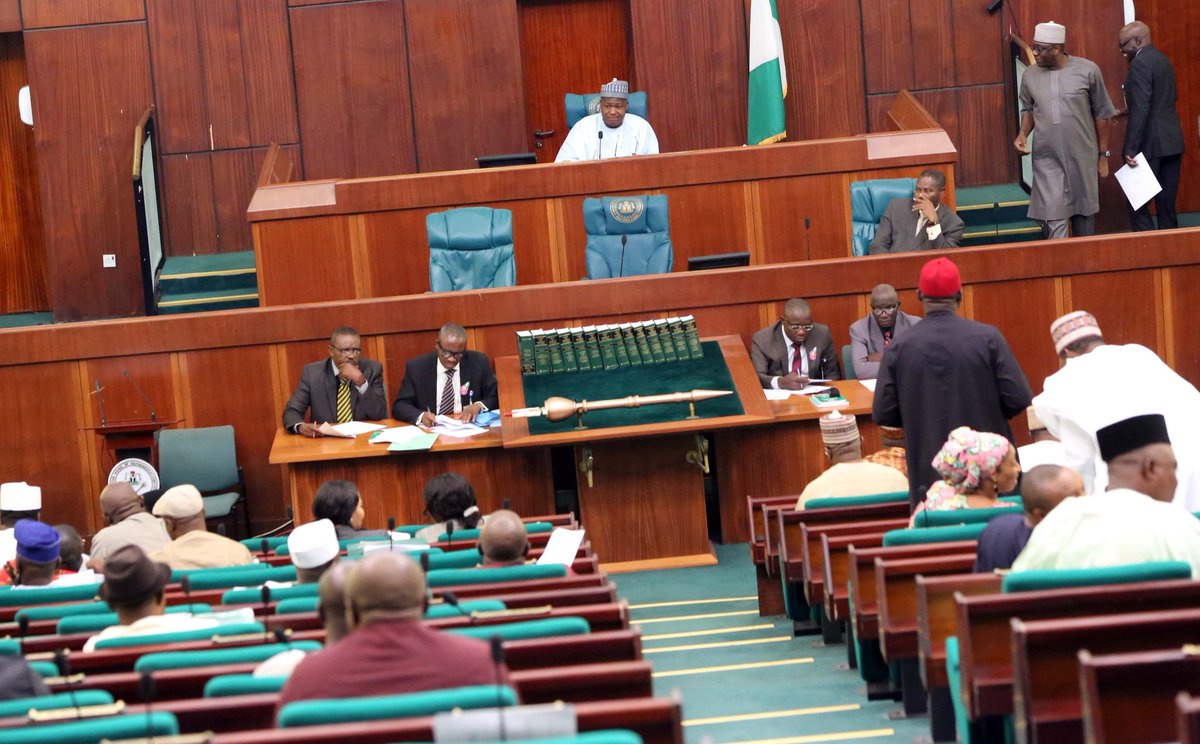- N2.8tn Probe: Reps Threaten Absentee Bank CEOs, Others With Bench Warrant
The House of Representatives has threatened to issue a bench warrant against the Minister of Justice and Attorney-General of the Federation, Mr Abubakar Malami; Accountant-General of the Federation, Mr Ahmed Idris; and managing directors/chief executive officers of Deposit Money Banks.
An ad hoc committee set up by the House to investigate the alleged non-remittance of stamp duty deductions sat in Abuja on Wednesday, where Malami, Idris and the CEOs were either absent or represented.
The House had on April 25, 2019, resolved to “mandate the set up of an ad hoc committee to urgently investigate the non-remittance of trillions into the Federation Account of TSA and report back to the House within four weeks.”
This was after the lawmakers adopted a motion that condemned the stamp duty charges imposed on Nigerians for their banking transactions.
The lawmakers had especially accused banks who made the deductions of non-remittance of about N2.8tn to Federal Government coffers, contravening the Treasury Single Account policy.
At the sitting on Wednesday, the panel, however, dismissed the representatives as not eligible to speak for their respective organisations and bosses.
The Chairman of the committee, Mr Ahmad Abubakar, said, “We can see that the Office of the Accountant-General and the Office of Attorney-General are conspicuously not here.”
He stated that those absent from the hearing had critical roles to play in the deliberations and final decisions to be taken by the lawmakers.
Abubakar added, “The chief executive officers of all agencies are supposed to be here. If by any reason they cannot attend, we expected their written authority, authorising somebody, not below the executive management level; even that is with the authority from the CEO. Otherwise, the organisation will be deemed not to have been here, and it is a serious matter.
“After this hearing, if it needs issuing a bench warrant, we are going to do that; This is a very serious issue. My colleagues are here and this will be our resolve. I don’t know whether most of the people that are here are below these two categories — either the CEO or executive director. We want people who can take critical decisions on behalf of their organisations. I don’t want you to come here and something is resolved, later the CEO would say ‘I am not here and I cannot…’ Whatever is the decision here is binding.”
Also, a member of the committee, Mr Danburam Nuhu, also criticised those who failed to attend the hearing.
“I can see from the roll call that only three banks are represented by somebody from their executive management. Those banks are Polaris, GTBank and Sterling Bank. All other banks don’t have somebody from their executive management.
“As clearly stated by you, Mr Chairman, it is the position of the committee to assume that they are not present at this hearing. It is clear that if the committee chooses to give another date, at the end of the day, they are still not present. I think the next thing as you clearly stated is that we go ahead and issue a bench warrant against the CEOs of the banks. That means that we will arrest them and compel them to be here,” he said.
Another member of the panel, Mr Adekunle Akinlade, consequently moved a motion that any agency or organisation without the CEO in attendance and without an executive director with a written mandate to represent them should be considered absent from the hearing.
The motion was seconded and unanimously adopted by other members of the panel.
In his ruling, Nuhu said the representatives in attendance, most of whom did not meet the criteria set by the lawmakers, would be allowed to remain as spectators without their submissions taken.
Meanwhile, the Postmaster-General, Mr Bisi Adegbuyi, told the committee that a plethora of cases at the Supreme Court and inter-agency rivalry between the Nigerian Postal Service and the Revenue Mobilisation and Fiscal Allocation Commission were frustrating the remittance of an estimated N2.8tn stamp duty funds.
According to Adegbuyi, banks are hiding behind the various conflicting court cases on the issue of stamp duty by not remitting the amounts collected to the Federal Government accounts.
In his submission, the acting Chairman of the RMFAC, Mr Casmir Anyanwu, said that it was the commission’s mandate to recover the stamp duties.
“The role of the commission in the collection of stamp duties is to ensure that the fund is remitted by the banks and that the circular of the Central Bank of Nigeria on the collection of stamp duties on every electronic transaction above N1, 000 be complied with; that the N50 deducted by the banks be promptly remitted to the Federation Account, verify and remit any outstanding amount from the banks. That is what we are doing at the moment.”
However, the acting Director, Banking Services, CBN, Mr Abubakar Kure, said remittances to the apex bank stood at N35bn.


 Forex3 weeks ago
Forex3 weeks ago


 Naira2 weeks ago
Naira2 weeks ago
 Billionaire Watch2 weeks ago
Billionaire Watch2 weeks ago




 Naira2 weeks ago
Naira2 weeks ago




 Naira2 weeks ago
Naira2 weeks ago




 Naira1 week ago
Naira1 week ago




 Naira4 weeks ago
Naira4 weeks ago




 Naira3 weeks ago
Naira3 weeks ago





















